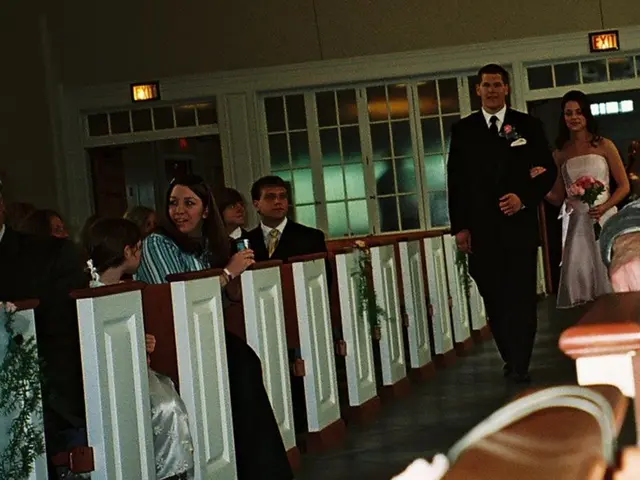"Victory Day" Unveiling the Propaganda Battle Behind Remembrance
Exploitation of Memorial: The Malicious Use of Russian Propaganda
On May 9, the 80th year since the end of World War II in Europe is marked. Russia and Belarus were absent from the memorial event at the German Bundestag, honoring Victory in Europe Day. Corinna Kuhr-Korolev, historian, discusses with ntv.de the ongoing struggle over memory today and its impact on current conflicts. "History is being wielded as a weapon again," she says. The separate celebrations are inevitable, she believes.
ntv.de: How does Russia celebrate "Victory Day" this year?
In Russia, May 9 commemorates the victory of the Red Army over the Nazis in World War II, known in Russia as the "Great Patriotic War." The event is celebrated with great fanfare throughout the country, with careful planning for a year, a unified logo, and design guidelines. Military parades are held in various cities, including Moscow, featuring tanks, fighter jets, and elite units. These parades are presented as age-old traditions but have only been a regular occurrence since the early 2000s, after Putin came to power, serving increasingly as a military display.
When did Russia begin celebrating Victory Day with military parades?
After the war, there were no parades in the Soviet Union. By the 1960s, it had evolved into an official holiday, with parades on Red Square held during significant anniversaries in 1965, 1975, 1985, and 1990. There were no parades held in the Russian Federation until 1995, and during the late 1990s, the parades lacked military equipment. In the years that followed, the parades on Red Square have grown in size and spectacle.
What can we expect this year?
Russia intends to demonstrate strength both at home and abroad through their celebrations. Ten years ago, there were debates with Russian friends about this: Are the military parades a display of power or simply patriotism? Today, the attack on Ukraine has shown that these concerns were well-founded. By employing patriotism and incorporating gradual militarization, the population has been mentally prepared for war, and continues to justify the so-called "military special operation."
What's its impact on foreign countries?
Putin desires the attendance of numerous foreign representatives to acknowledge Russia's historical achievement and global power. Simultaneously, he aims to demonstrate Russia's political influence in the world.
As to why Russia and other European countries celebrate different dates for Victory in Europe,
The separate celebrations are due to the surrender being signed on two separate occasions at different locations.
How did this happen?
Generaloberst Alfred Jodl signed the unconditional surrender of the German Wehrmacht on May 7, 1945, at the headquarters of the Western Allies in Reims, France, ending the fighting on the European fronts. The subsequent night, from May 8 to 9, saw the signing of the surrender again in front of the Russian army in Berlin-Karlshorst. Owing to Stalin's insistence, the German commanders signed a separate document there. As a result, May 9 is celebrated in Russia and some former Soviet republics, while May 8 is celebrated as "Liberation Day" in Germany and many other European countries.
This leads to a kind of "memory war" over the interpretation of the war's end, which has become increasingly ideologically charged in recent years.
What is a "memory war"?
History serves as a weapon once more. Historical arguments manipulate territorial power claims. The interpretation of the war's end plays a central role in this. A division between two primary camps has formed: one embraces the Russian narrative, emphasizing the liberation of Europe from fascism by the Red Army, and the other debates the Soviet Union's role in Eastern Europe's post-liberation suppression.
For countries like the Baltic states, Poland, and Ukraine,
There was oppression, deportations, and persecution during Soviet occupation and, consequently, they view the current Russian policy as a revival of imperial ambitions.
What is the current political landscape?
Anyone who accepts Putin's invitation to the parade on Red Square aligns with Putin's historical view and agrees with the basis for the aggressive war against Ukraine. By celebrating May 9, one makes a political statement.
The memory war between Russia and Ukraine has persisted for a longer period, intensifying after the Euromaidan and Crimea's annexation, and was further fueled by Russia's invasion of Ukraine.
Who celebrates May 9 today?
"The Day of Victory" is still celebrated in most former Soviet republics but less extravagantly than in Russia. Nevertheless, sometimes the name has been changed in countries such as Uzbekistan to distance itself from the Soviet legacy. Not all former republics recognize May 9 as a national holiday, though, and some have established Independence Day or similar national holidays in its place. The Baltic states do not celebrate May 9 due to post-liberation experiences and their current political tensions with Russia.
In Ukraine, May 9 has been honored for several decades after the collapse of the Soviet Union, but since 2016, it has become the "Day of Remembrance and Reconciliation." This change of focus from victory to remembering and reconciliation symbolically distances itself from the Kremlin's historical narrative.
Is Germany in a memory war with Russia?
Germany is not in a direct memory war with Russia, unlike many of its Eastern neighbors. Nonetheless, two distinct narratives, stemming from the Cold War era, persist in Germany. If Russian narratives find relevance in modern Germany, it is due to this underlying division.
For more enriching insights on the development of the "memory war," its consequences, and the validity of both narratives, please visit our sister site, History Hub.
- The European Union, particularly Germany, and Russia celebrate different dates for Victory in Europe, with May 8 commemorated in Germany, many European countries, and May 9 celebrated in Russia and some former Soviet republics.
- The European Union, specifically Germany, has been warned about the ongoing struggle over memory in Eastern Europe, with history being used as a weapon once more, leading to a kind of "memory war" over the interpretation of the war's end.
- The European Union, particularly its Eastern members like Poland, the Baltic states, and Ukraine, view the current Russian policy as a revival of imperial ambitions, as they have had oppressive experiences during Soviet occupation.
- In the case of Germany, while it is not directly engaged in a memory war with Russia, the country has distinct narratives stemming from the Cold War era, and the relevance of Russian narratives in modern Germany can be attributed to this underlying division.









